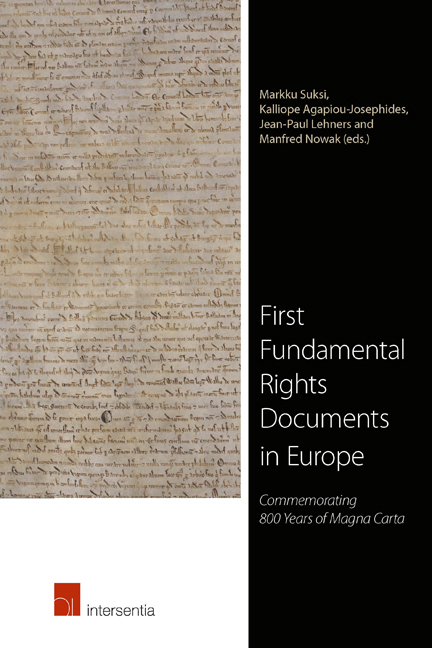Book contents
- Frontmatter
- Preface
- Contents
- List of Authors
- 1 Introduction
- PART I
- PART II
- 11 France: Foundational Importance of the Declaration of 1789
- 12 Sweden: Free Press as a First Fundamental Right
- 13 The Netherlands: The Batavian Staatsregeling as the First Fundamental Rights Document
- 14 Portugal: ‘Tropical Versailles’ in the Beginning of the Nineteenth Century
- 15 Luxembourg: Fundamental Rights in a Small State
- 16 Greece: Reflections from the Hellenic Legal Tradition
- 17 Denmark: In Love with Tradition
- 18 Germany: Fundamental Rights as an Instrument Towards the Rechtstaat
- 19 The Czech Republic: On the Road to Rights and Freedoms
- 20 Romania: The Birth of Fundamental Rights as a Form of Political Contention
- 21 Bulgaria: The Liberal Tarnovo Constitution
- 22 Finland: Rights to Facilitate Participation
- 23 Estonia: First Landmarks of Fundamental Rights
- 24 Slovakia: The Right of a Nation
- 25 Latvia: Second Part of the Constitution as a Project for Next Generations
- 26 The History of Fundamental Rights in Europe: A Long and Winding Road
- Index
22 - Finland: Rights to Facilitate Participation
from PART II
Published online by Cambridge University Press: 15 December 2017
- Frontmatter
- Preface
- Contents
- List of Authors
- 1 Introduction
- PART I
- PART II
- 11 France: Foundational Importance of the Declaration of 1789
- 12 Sweden: Free Press as a First Fundamental Right
- 13 The Netherlands: The Batavian Staatsregeling as the First Fundamental Rights Document
- 14 Portugal: ‘Tropical Versailles’ in the Beginning of the Nineteenth Century
- 15 Luxembourg: Fundamental Rights in a Small State
- 16 Greece: Reflections from the Hellenic Legal Tradition
- 17 Denmark: In Love with Tradition
- 18 Germany: Fundamental Rights as an Instrument Towards the Rechtstaat
- 19 The Czech Republic: On the Road to Rights and Freedoms
- 20 Romania: The Birth of Fundamental Rights as a Form of Political Contention
- 21 Bulgaria: The Liberal Tarnovo Constitution
- 22 Finland: Rights to Facilitate Participation
- 23 Estonia: First Landmarks of Fundamental Rights
- 24 Slovakia: The Right of a Nation
- 25 Latvia: Second Part of the Constitution as a Project for Next Generations
- 26 The History of Fundamental Rights in Europe: A Long and Winding Road
- Index
Summary
INTRODUCTION
Participation appears to be the main objective in the rights discourse of Finnish constitutional history. Participatory rights in the broad sense were present as early as 1766, in the Freedom of the Press (Constitution) Ordinance, issued at a point of time when territories currently forming Finland were an integral part of the Kingdom of Sweden. Participation through elections, together with complementary rights necessary for meaningful participation (freedoms of speech and the press, of association, and of assembly), were in focus in 1906 when electoral reform introduced a unicameral parliament based on proportional elections in what was then an autonomous part of the Russian Empire.
At these two junctures, Finland did not exist as an independent state: independence occurred only in 1917. Until separation from the Kingdom of Sweden in 1808–1809, areas that today make up Finland were included in the regular Swedish legal order. This was significant from the point of view of constitutionally established fundamental rights, because during the eighteenth century the Swedish legal order started to make a distinction between constitutional laws or fundamental laws on the one hand, and ordinary laws on the other. Upon the separation from the Kingdom of Sweden in 1808–1809 this understanding was carried over to the separate Finnish jurisdiction: in a pledge of the Czar of Russia on 27–29 March 1809 (the legal effects of which are debatable), it was said that Finland would be ruled under the law that had previously been in force in Finland. In the area of constitutional law, this meant that the 1772 Form of Government (Constitution) Act of Sweden and the 1789 Act of Union and Guarantee of Sweden were considered to be in force. Consequently, while being an autocratic ruler in the rest of the Russian Empire, in Finland the Czar was, at least in the minds of Finnish lawyers of the time, a constitutional monarch under the title of the Grand Duke of Finland.
Therefore, two sets of first documents of a fundamental rights nature are identified here. On the one hand, reference will be made to the 1766 rules on freedom of the press and access to government-held documents, because these rules appear to have their political and intellectual root in what is today Finland, and, on the other hand, the presentation will also encompass the 1906 electoral rights and accompanying political rights.
- Type
- Chapter
- Information
- First Fundamental Rights Documents in EuropeCommemorating 800 Years of Magna Carta, pp. 277 - 294Publisher: IntersentiaPrint publication year: 2015



